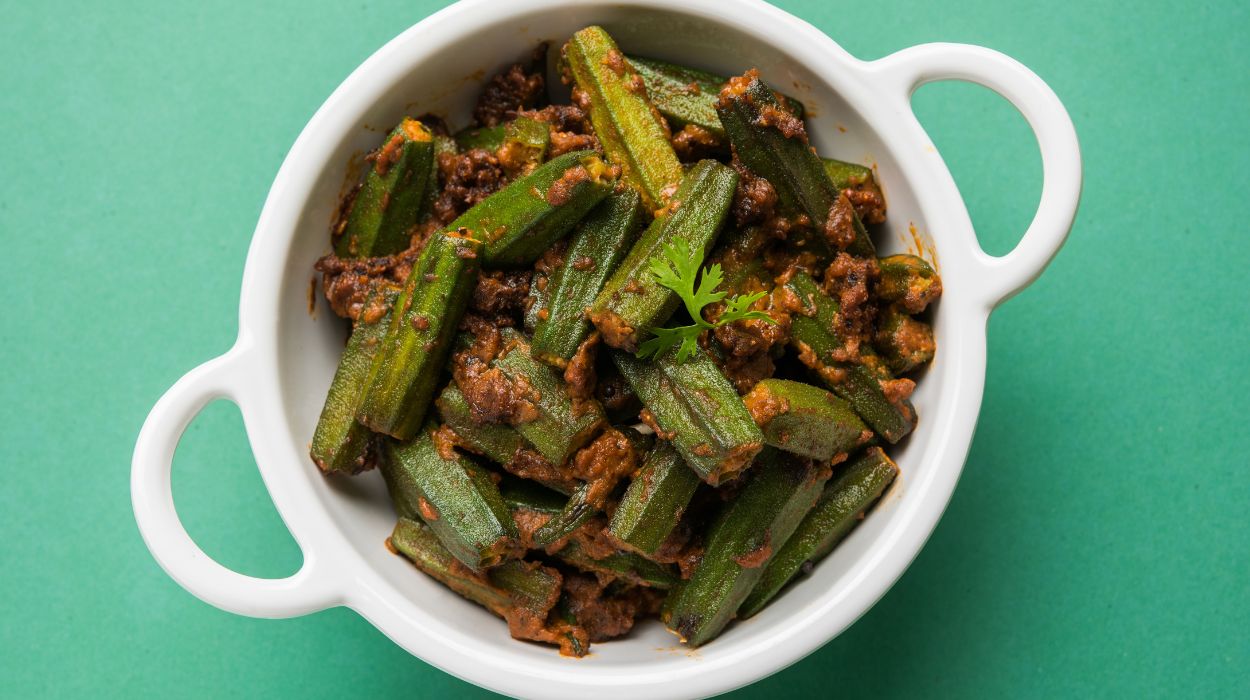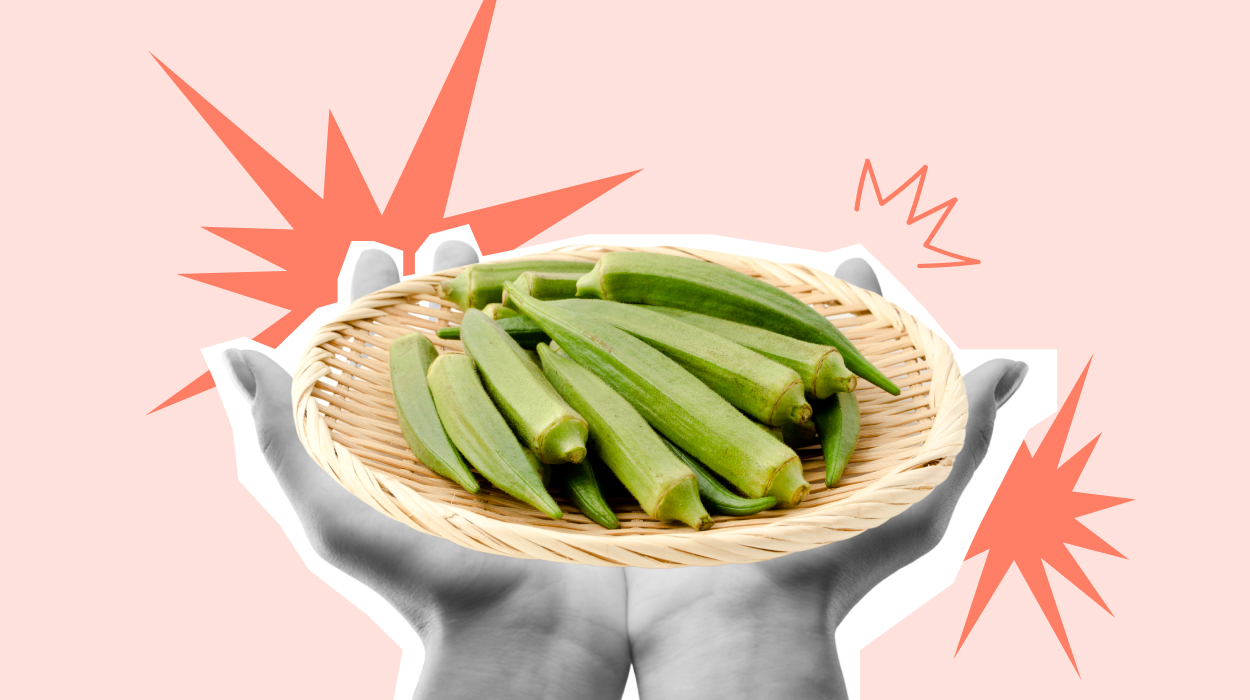Though not widely known, okra emerges as a nutritional powerhouse with a variety of health benefits. Okra benefits the cardiovascular system, and bones, and supports a healthy pregnancy.
In this article, we will delve into the world of okra health benefits. We will explain what okra tastes, and how to add it to your diet. Finally, we’ll take you through any side effects and precautions you need to be aware of.
Let’s take a closer look at the health benefits of okra and whether it is good for you.
Health Benefits Of Okra
Okra can offer several health benefits.
- Rich in essential nutrients like potassium, fiber, and antioxidants, it supports heart health, blood sugar control, and bone health.
- It may also support a healthy pregnancy, and inhibit cancer cell growth.
- When considering adding okra to your diet, consider its taste and texture. You can try a variety of cooking methods to prepare it to your liking.
- Some people, especially those with pre-existing digestive issues, may experience gastrointestinal discomfort when eating okra.
- Okra may interfere with certain medications, so it’s always best to speak to a healthcare professional if you have any concerns.
Health Benefits Of Okra

While not the most popular cooking ingredient, okra boasts a spectrum of health benefits. Here are five health benefits of okra:
Cardiovascular Health
Okra has a potassium content.[1] Increased potassium intake is associated with a lower risk of hypertension,[2] a major risk factor for heart disease.
The dietary fiber in okra is linked to improved cholesterol levels. Scientific research suggests that diets high in fiber can lead to a reduction in cholesterol.[3] Okra is also loaded with pectin which modifies the creation of bile in the intestine which lowers cholesterol.
Okra’s have been shown to fight oxidative stress[3] and inflammation, crucial factors in the development of cardiovascular diseases.
Blood Sugar
Scientific research[4] highlights the potential of okra to support blood sugar management. Okra is particularly high in fiber, leading to better glycemic control.[5]
Fiber slows digestion of carbohydrates, leading to a more gradual release of glucose into the bloodstream. This helps prevent rapid blood sugar spikes, which is particularly important for people with diabetes.
Okra contains antioxidant compounds such as polyphenols and flavonoids, known for their potential anti-diabetic properties.[6] Eating okra reduces blood sugar levels[7] in people with diabetes.
Pregnancy
Sufficient folate intake is important to prevent neural tube defects during pregnancy. Okra’s folate content can contribute to the daily recommended intake for pregnant people and has been shown to support a healthy pregnancy.[8]
Okra also provides a range of essential minerals, including iron and calcium, also important for pregnancy.
Okra’s antioxidants may also play a role in supporting a healthy pregnancy.[9] Antioxidants help fight oxidative stress, which can be heightened during pregnancy, supporting overall health and well-being.
Cancer
Okra contains a protein called lectin, which has demonstrated anti-cancer properties[10] in some studies. Okra’s rich fiber content may also help prevent cancer. Diets high in fiber have been associated with a reduced risk of certain cancers.[4]
In one study, okra seeds showed promising potential in reducing the growth of breast cancer cells. The antioxidants, particularly flavonoids, found in okra seed extract[11] inhibited cancer cell growth in human breast cancer cells. In another study, red okra pods were shown to inhibit the growth[12] of cervical cancer cells.
Bone Health
Research has revealed a connection between eating okra and bone health.[13] Okra is a rich source[1] of essential nutrients crucial for bone strength, including calcium, magnesium, and vitamin K.
Calcium has a vital role[14] in bone formation and maintenance, and higher intakes of calcium-rich foods have been linked to osteoporosis prevention.[15] Magnesium, another mineral found in okra, is essential[16] for bone structure and function. Vitamin K, another essential vitamin in okra, plays a key role in bone metabolism[17] and regulating calcium in the bones.
What Is Okra And How Does It Taste?
This flowering plant, celebrated for its edible seed pods, thrives in tropical and warm climates like Africa and South Asia. Sometimes known as the “lady’s finger”, okra is either red or green.
While biologically classified as a fruit, okra is often used as a vegetable in various dishes. Its somewhat slimy texture doesn’t appeal to everyone. The taste of okra is mild, with a subtle, grassy flavor.
The cooking process can enhance and change okra’s taste and texture. Read on for ideas on how to prepare it and incorporate it into your diet.
Okra can be a great addition to weight loss diets due to its low-calorie and high-fiber content. To lose weight, you need to maintain a calorie deficit and have a diet that includes healthy foods like smoothies, a variety of vegetables, and whole grains. If you’re struggling with your fruit and vegetable intake, supplements and powders can be a convenient option for you to boost your intake.
How To Eat Okra

There are so many ways to cook okra. One popular method is incorporating it into savory dishes like soups, stews, or gumbo.
One key advantage of okra is variety. Okra can be sliced, sauteed, or roasted to achieve a good crunch while preserving its natural flavors.
Okra water is a drink made by soaking sliced okra pods in water overnight. This process allows the soluble fiber and nutrients from the okra to infuse the water. Some believe that drinking okra water may provide health benefits, however, the scientific research is currently limited.
Tips To Eat More Okra
Here are some easy and delicious ways to incorporate okra into your diet:
- Transform it into a nutritious snack by roasting it in the oven until golden and crispy.
- Enhance your pasta dishes by cooking okra with tomato sauce, creating a nutritious topping.
- Elevate the flavors by grilling raw okra until it is slightly charred.
- Saute okra with garlic for a quick and tasty side dish.
- Boost your stir fries or salads by adding cooked okra, crunch, and nutrition.
Are There Any Side Effects And Precautions?
Excessive consumption of okra may have side effects on certain people due to some of its nutritional components.
Okra contains fructans,[18] a carbohydrate known to cause digestive tract issues[18] in some people, especially those with pre-existing issues. To maintain healthy digestion, prioritize a diet rich in fiber, hydration, and probiotics.
The high oxalate content[19] in okra poses a concern if you’re susceptible to kidney stones, as when accumulated, oxalates can contribute to the formation of stones.[20] This risk may be higher if you have a history of developing kidney stones, especially if you’re also eating other high-oxalate foods like spinach.
If you’re taking blood thinners like warfarin, the vitamin K content in okra may impact[4] blood clotting. While vitamin K is crucial for blood clots, people taking this type of medication should maintain a consistent intake[21] of vitamin K-rich foods to manage these interactions.
If you have any specific health conditions or take any medication, always consult a healthcare professional before making any major changes to your diet.
Conclusion
While okra may not be the most popular ingredient, its nutritional benefits are certainly noteworthy. From supporting cardiovascular health, and managing blood sugar levels, to promoting bone health, okra can be a versatile and healthy addition to your diet.
Experimenting with different cooking methods, such as sauteing, or grilling, can enhance its taste and texture, making it an enjoyable component of your meals.
As with any dietary changes, it’s advisable to speak to your healthcare provider.
Frequently Asked Questions
Generally, most people can tolerate okra with no side effects. However, some people may experience gastrointestinal discomfort, like gas and bloating, due to the fructans it contains.
While okra is a nutritious food, its high oxalate content may pose concerns if you’re susceptible to kidney stones.
Eating okra every day is generally safe and offers many health benefits. However, people with specific conditions, like kidney stones, should moderate their intake. Always speak to a healthcare professional for personalized advice before making any significant dietary changes.
Okra is generally safe, but excessive consumption may cause digestive issues. Its high oxalate content may concern those prone to kidney stones. People on blood thinners should monitor their vitamin K intake.
 Evidence Based
Evidence Based